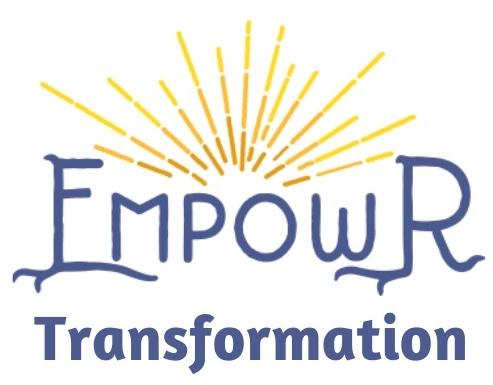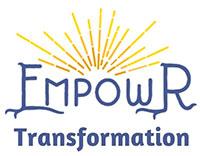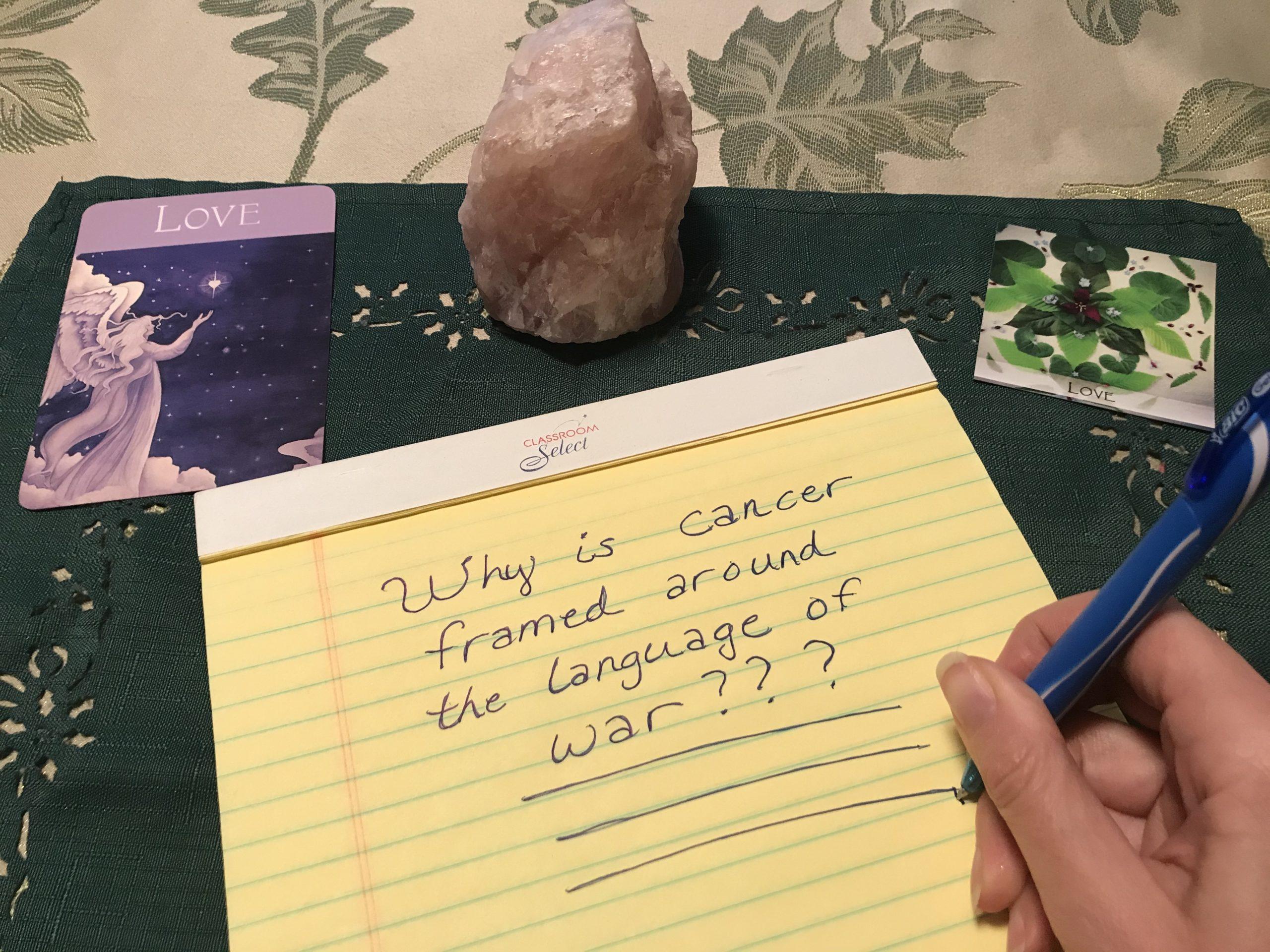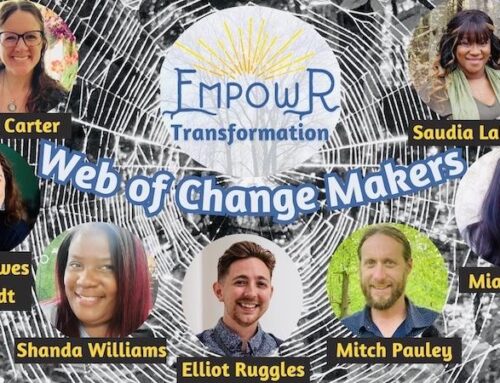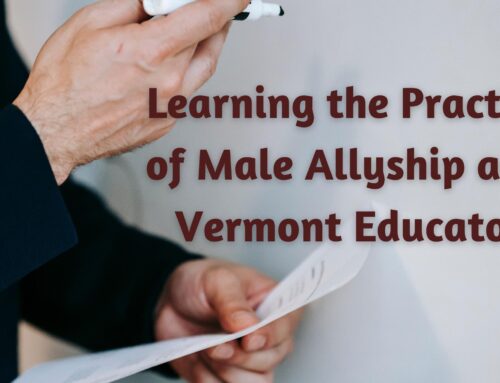If beating cancer means that you win, do you lose if you die? If someone is “battling” cancer, how can we make more space for language about love and less for words about fighting? When cancer is framed as a war, it implies there are winners and losers. Where is the grace for people who may have lost their lives, but won at life?
Cancer invaded my breast, marriage, safety, relationships, career, cognitive function, and zest for life. Early on in the diagnosis, I cringed at the aggressive wishes to fight for my life. The last activity I wanted to engage in while suffering from cancer was fighting.
As a writer and communications professional, I thought more deeply about language than one might while navigating a cancer diagnosis. The language of cancer is steeped in patriarchy just as the “cancer club” is steeped in white privilege. As the systems of oppression and white male dominance crack and reveal the inequity all around us, language is also simultaneously changing. I challenge us to adjust the language of cancer to reflect our shifting culture.
As feminine energy rises to bring our world back into balance–with empathetic and nurturing energy to replace fighting and controlling energy–how can we hold the growing number of people being diagnosed with cancer with love and compassion? How can we encourage the nurturing and healing that anyone navigating a cancer diagnosis, as well as their caregiver, so deeply needs and deserves?
Inequity and injustice in the health care system greatly contributes to the dialogue of how one might successfully recover from cancer or how one might lose their life. Put simply, people with adequate health care coverage are more likely to “win” and people without health insurance lose their dignity and their lives. Health care prioritizes profit over the health and wellness of people, especially people who are excluded from dominant society because of race, class, gender, or disability. Read more about health care profit in the article No Profit in Cancer Prevention.
Breast Cancer and Pink Ribbons
Our voices in the health care system matter and we do have control over how we speak. Marketing messages glamorize breast cancer, setting a cultural standard for how we’re “supposed” to talk about cancer. These messages compartmentalize very different individuals into outdated patriarchal expressions of gender and femininity, further perpetuating the expectation of how someone with breast cancer is supposed to behave in society.
The “pink ribbon image” inaccurately paints the picture of the perfect breast cancer patient and reinforces with society a harmful depiction of how someone with breast cancer should act, look, feel, spend their time, and what kind of treatments, behaviors, and side effects are acceptable for the comfort level of people in society–which completely ignores the comfort of the person with the actual cancer in their body. Women who behave outside of the societal norms associated with the “pink ribbon image” of breast cancer are shamed and blamed for how they choose to navigate their personal breast cancer journeys. I know, I was one of them.
40,000 women die of metastatic breast cancer each year (Breast Cancer Action). They lost their lives. Did they not fight hard enough? Think positive enough? Wear pink enough? The rest of us to which breast cancer was not life-threatening now face life-long physical, mental, emotional, and financial burdens—vastly different from how we are portrayed in marketing and the expectations those portrayals place on us as we return to society following a cancer diagnosis. Even more absurd is that major sponsors of pink ribbon campaigns (e.g. Avon) produce products with known cancer-causing ingredients, yet are a primary source for cancer messages we use in society.
- “You’ve Got This” – Places the burden on “you with cancer” and implies isolation. A support system is vital for someone with cancer. What we need to hear is “We’ve Got You.”
- “Think Positive” – Shaming and projecting language which encourages avoidance of feelings. We need to be able to feel and release all emotions, not be told how to think or what to feel.
- “Fight Like a Girl” – We are women and breast cancer deeply challenges self image, which is exacerbated given the expectations of physical image in dominant society.
- “Kick Cancer’s Ass” – A very masculine sentiment when love, tenderness, and compassion are what someone with cancer needs to feel, not messages which trigger fight, flight, or freeze responses in the body.
Fear and Depth in the System
Early on in my diagnosis, the message was very clear—kill the cancer, cut it out, right away! This enhanced feelings of fear and stimulated anger towards my body. As I searched for more integrated and participatory methods to address my interconnected health issues, I discovered there are other ways to talk about cancer—love the body, show it kindness, hold compassion for the part that is undergoing treatment, learn to listen to intuition and advocate for personal needs.
I began to wonder why the language used to speak about cancer to patients was so vastly different between conventional and holistic medicine. I recognize many who work in the conventional medical system are suffering from a moral crisis because they are trying to do their life’s work to heal people in a system that is failing the very people it intends to serve. Holistic medicine is inaccessible to people with limited incomes and for the most part is not covered by health insurance, further perpetuating socio-economics as a defining factor of “winning” and “losing” when it comes to cancer.
The blatant disregard from some conventional doctors about holistic practices and the financial barriers for holistic options were equally challenging for me as I navigated both conventional and holistic medicine. However, myself and most any person who has been able to find balance with conventional and holistic treatment and recovery options, will agree that both perspectives lead to the healthiest path to treat, recover from, and further prevent cancer.
Conventional medicine’s approach to treating cancer is reactive and symptom-focused—a critical component for treating invasive and advanced cancer. However, it completely misses the mark on addressing the root cause of dis-ease. Prevention efforts in conventional medicine focus on behaviors a person can choose to refrain from and the use of early detection technology without much consideration to environmental and social factors.
Yet cancer prevention involves so many additional factors that influence how we speak about the cancer epidemic. More than 1.8 million new cancer cases are expected to be diagnosed in 2020 in this country (American Cancer Society). Authentic and honest conversations about cancer and the challenges of the current medical landscape raise a broad spectrum of questions directly relevant to prevention.
- When does nutrition become a core component of conventional medicine?
- How do conventional and holistic practitioners find common ground and align their efforts centered on patient care of the whole person, not just a symptom?
- How do we better understand the differences in our individual bodies, genetics, and DNA mutations taking place in our lifetime and approach medicine that can serve individuals rather than statistics?
- How do we make health care equitable and accessible for all people?
- When is wellness prioritized over profit in the unhealthy pace of capitalistic society which is a root cause of so much suffering and dis-ease?
- How can more people become aware of the toxins in products, food, and our environment as causes of cancer and how can we shift our consumer-driven mindset and at the same time address the inequity and injustice that forces people into unhealthy choices ?
- When do we realize the side effects of some pharmaceuticals are worse than the symptoms and perpetuate an endless cycle of dependence driven by corporate greed?
- When do we make the connections between climate change, capitalism, and the destruction of the planet as direct causes of cancer?
These are big questions and sources of anxiety for many people. Some people are working diligently on solutions to these questions as a part of their life’s work or purpose. Others are a part of the problem. Many feel helpless or apathetic, only able to focus on how to move through each day. But there are growing numbers of us who are raising the impact of our voices and WE can affect change by shifting how we speak. We can also take responsibility for how our feelings of discomfort influence our behavior and how that behavior can cause harm. AND we can encourage others to do the same.
Regardless of who we are and what our life challenges might be, we all have a voice and we all probably know someone with cancer, and if not, we most likely will soon. We have the power to change how we speak about cancer and to demand changes in the systems around us.
Love and Compassion
Cancer brings up feelings of mortality for many people, which are painful and difficult topics for individuals and families to discuss. The bridge between fighting language and compassionate language is wide and is often met with silence or avoidance. Can we narrow the gap in our own lives by not using the language of war to talk about cancer or any dis-ease for that matter? Can we use our voices instead of being silent and speak with kindness, empathy, and respect?
Compassion for others helped me begin to understand how to love myself for who I am. I was able to stop fighting and could focus my energy on healing. By sending compassion to the parts of my body that were hurting, rather than trying to fight with the symptoms, I began to feel less pain. The expressions of love and compassion from other people made me feel like I could navigate the cancer diagnosis and find wholeness and acceptance with the outcome.
As I began to understand the causes of cancer and the complexities of prevention, I developed empathy for health care practitioners and all of the people trying to provide care in a broken system. As I connected with more people who are in pain and suffering while also trying to navigate the broken health care system, my capacity for compassion and a commitment to serving humanity grew.
Love and compassion have a powerful ripple effect. Considering that we all want to feel compassion and to be loved, can we give each other the gift of communicating with kindness, empathy, and tenderness instead of fighting cancer with the language of war? We can strengthen the ripple effect of love and compassion, and, in doing so, fill our hearts with the positive change we have the power to create.
Rae offers healing sessions for people at any stage of a cancer diagnosis, including when in remission and healing journeys that extend well beyond cancer.
Please consider becoming an EmpowR Patreon to join our community of co-creating change!
